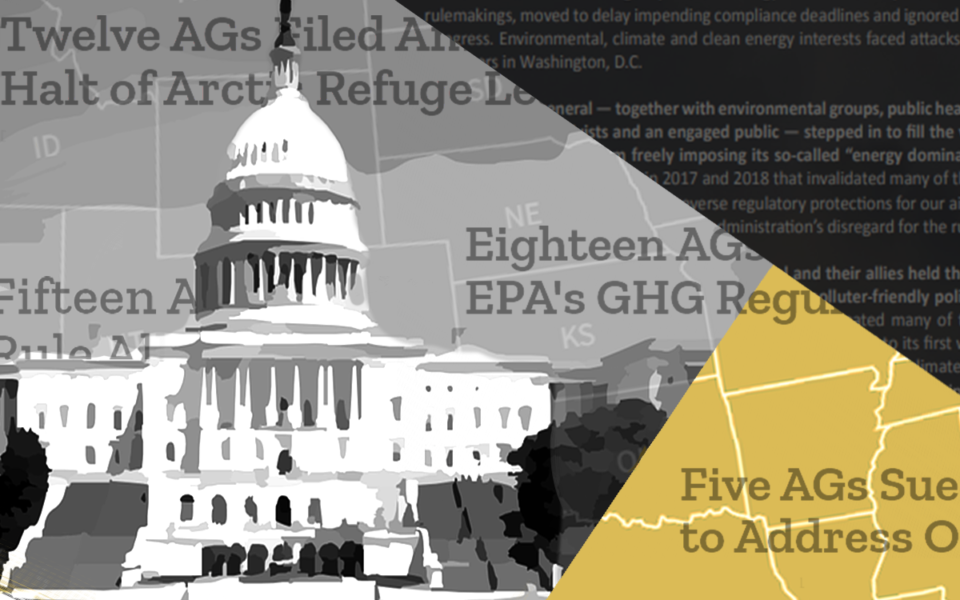How the Biden Administration is Shaping State AG Enforcement Efforts
Georgia Rock / August 19, 2022

This piece is part of our Student Blog Series, featuring posts on climate, clean energy, and environmental issues from the State Impact Center’s legal interns and other students working with the Center.
In the early months of the Biden administration, there was excitement and speculation about how state attorneys general would engage with and react to the new administration’s environmental policies. Now, eighteen months into Biden’s presidency, there is enough data to confirm that there has been a significant shift within state AG’s environmental work.
According to our AG Actions Database, which tracks state AG actions that work to advance clean energy, climate, and environmental laws and policies, there were 153 actions in federal litigation during the Trump administration, most of which involved challenges to Trump-era rules and rollbacks.1 Six of these actions involved state AGs supporting a federal agency. In the same period, there were 53 non-federal litigation actions. Since Biden’s inauguration, there have been 10 federal litigation AG actions and 109 non-federal actions. The number of non-federal litigation actions from the last eighteen months (January 20, 2021 – June 30, 2022) is over twice as many from the entire Trump period. Because the AG Actions Database mainly collects information from publicly available sources, there are certainly many enforcement actions not captured in the database. Nevertheless, the comparative rise in state actions within the database is still striking.2It may be attributable to a combination of freed up resources, a shift in the tools state AGs use to advocate, and an increasing focus on environmental justice.
Many state AGs took on the role of fighting the Trump administration’s harmful environmental rules and rollbacks between 2017 and 2021. California AG Rob Bonta stated that the Trump administration felt like a “full-on frontal assault from Washington” and “took a lot of air out of the room in terms of what the environmental work could be at the time.” With the Biden administration being proactive in restoring and progressing with environmental policies, state AGs aren’t focused on holding the line and can devote resources to expanded work in their states.
A contributing factor to this shift could be that state AGs are advocating more through comments to the Biden administration instead of litigation. According to the database, there were 125 comment letters focused on advancing clean energy, climate and environmental laws during the Trump administration. In the first 18 months of Biden’s presidency, there have already been 72 comment letters, suggesting that comments during the Biden administration will outnumber those during Trump’s presidency by the end of 2024. Furthermore, state AGs have been engaging with a broader array of agencies than before. During the Biden administration, AGs have so far submitted comments urging agencies such as the Department of Labor, the Securities and Exchange Commission, and the Food and Drug Administration to consider climate change, clean energy, and toxicity while conducting rule-making.
Another trend is the growth in environmental justice litigation. This litigation has been a growing area of state AG work. States such as California and New Jersey have been expanding their environmental justice work for years. In 2018, California and New Jersey both created environmental justice units within the AG’s office. Now, Washington and New Mexico AGs are developing environmental justice initiatives as well. The AG Actions Database includes 13 state-level litigation actions related to environmental justice since Biden’s inauguration, including an action that encompasses seven environmental justice lawsuits brought by the New Jersey AG in October 2021. At the same time, Biden’s commitment to environmental justice may be galvanizing more efforts in the field. He created the first ever White House Environmental Justice Advisory Council and included environmental justice issues in the Justice40 initiative, which aims to deliver 40 percent of benefits from federal investments to disadvantaged communities.
Some state AGs are urging the Biden administration to go further with environmental justice by pushing to include considerations related to environmental justice concerns in environmental impact statements. For example, in May 2021, New York AG Letitia James led a coalition of five states in submitting comments to the Army Corps of Engineers, urging the Corps to analyze environmental justice impacts as part of its environmental impact statement. This example also indicates that state AGs are not shying away from pushing the Biden administration on environmental concerns. There are already several challenges to Biden-era rules, as well as Trump-era rules that the Biden administration is planning to continue. In 2021, Massachusetts AG Maura Healey emphasized that her office was open to pushing back on Biden’s rules. For example, in February of this year, Massachusetts joined a California-led coalition challenging Biden’s continuance of a Trump-era rule involving greenhouse gas emission standards for airplanes and airplane engines. This is yet another sign that AGs won’t overlook the Biden administration’s actions simply because it is working to enhance policies related to clean energy and climate change. Instead, state AGs are evaluating Biden’s policies, supporting the policies that warrant support and challenging those that fail to promote clean energy and address climate change.
This page was updated on March 5, 2024 to better meet our accessibility standards. To see the page as it was initially published, click here.
- The Center’s AG Actions Database tracks actions of regional and national significance taken by state attorneys general to advance clean energy, climate, and environmental laws and policies. While the Center strives to be thorough in recording state actions in the database, we cannot guarantee that every action is represented here. Furthermore, there may be more than one action in a singular case. For example, there may be one AG action in the database detailing a coalition of states filing an amicus brief for a case, and another action for a state filing a separate amicus brief in the same case.
- The Center relies primarily on AG press releases and publicity to gather actions for the database.
